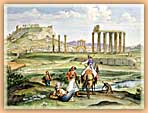 |

The establishment of the Greek state was accompanied by a series of ruptures which fragmented Greek society. The construction of a modern institutional framework (similar to the Western model) posed de facto the issue of the modernization of society. It was a society split into many relatively autonomous administrative, economical and socio-political centres of power. The unifying and centralizing logic characteristic of the modern state required the application of laws and rules common to the entire state. However, the homogenization of the economical, social and political fields under a strictly centralized state mechanism meant, in the case of Greece, disorganization for local and peripheral centres of power. This prospect affected not only local elites which were traditionally the leaders in Greek society (local notables, chieftains, clergymen); it actually put the main axes of social organization (local character, family ties, religion) to the test. The prevalence of the modern institutional framework which accompanied political independence was much resisted, especially in rural areas. Banditry and local armed revolts, as well as the emergence of a debate which preceived in these changes the decline of traditional values, constituted different versions of the resistance of an important (as regards numbers and social status) part of Greek society. In other words, the social tension prevailing over the biggest part of the 19th century constituted a way of expressing distrust in change. This reaction was one of the basic characteristics of Greek society in the 19th century. At the same time, social tensions showing the extent and importance of change were particularly felt in urban centres. If rural areas were a source of mistrust and resistance to every innovation, the cities and the capital in particular generally reflected individual instances of breaking with the past. The formation of an administrative mechanism led to the gradual shaping of a social group which was new and at the same time composed of many people: the civil servants. The development of the secondary and tertiary sectors of production and the gradual prevalence of salaried work caused the middle classes to grow in number, and created the conditions for the formation of working classes. These new social categories believed in new values (among which was literacy), and in their daily life they adopted different (Western-like) models in clothing, housing, nutrition, hygiene, music, entertainment and social events. It was certainly a different kind of Greek society. In short, the Greek society of the 19th century experienced a fundamental paradox which could schematically be described as the co-existence of the old and the new, traditional and modern. This paradox existed throughout the whole of society, (re)shaped it and consequently constituted its basic feature. In the light of this, the mistrust and resistance on the part of traditional groups and rural areas in general did not suggest the persistence of the old, but one of the ways of adjusting to the new.
|
 |